Poland and Baltic States
Polish priorities in next 4 years.
10 Nov 2011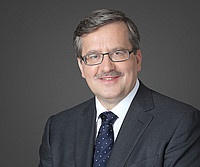 The need for economic growth, the demographic changes, and the preparation for entering into the eurozone are the top three priorities for Poland in the next four years according to President Bronislaw Komorowski. The head of State gave a speech at the new Parliament lower house Sejm’s inaugural meeting.
The need for economic growth, the demographic changes, and the preparation for entering into the eurozone are the top three priorities for Poland in the next four years according to President Bronislaw Komorowski. The head of State gave a speech at the new Parliament lower house Sejm’s inaugural meeting.
The first challenge is to “improve state’s functioning,” Komorowski said, underlining that in times difficult for Europe “only courageous and wise actions will allow Poland to continue stable economic growth.”
Poland must pay attention to growing life expectancy, and low total fertility rate. “The forecasts give a reason to worry and require a deep analysis,” he highlighted. The necessary steps should include “public debate about gradual increase of retirement age” to assure decent pension benefits, “support for responsible parenting” and completing the healthcare system reform.
The third challenge is the crisis in Europe. Poland should “reach the readiness to adhere to the eurozone,” Komorowski said. “It is about awareness that this is the way leading to further development.” Clearly the condition is to contain the current crisis,” the President observed. “Without membership Poland will be deprived of a chance to play a role in the world, adequate to our aspirations.”
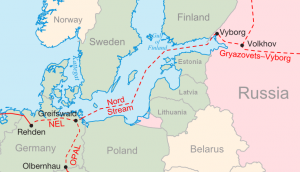 Il Sogno della Gazprom si è finalmente realizzato. Russia e Germania sono adesso unite da un gasdotto che evita il passaggio su territori dei riottosi vicini.
Il Sogno della Gazprom si è finalmente realizzato. Russia e Germania sono adesso unite da un gasdotto che evita il passaggio su territori dei riottosi vicini.
Il Nord Stream entra in funzione alla presenza del presidente russo Medvedev e del cancelliere tedesco Merkel. Il costo per costruire i 1223 chilometri di pipeline sotto al mar Baltico è stato di 8,8 miliardi di euro. Alcuni leader nazionalisti polacchi hanno definito questa megaopera tecnologica un nuovo “patto del diavolo” come quello tra Molotov e Ribbentrop dell’agosto 1939. Ma tutti i Paesi baltici in generale hanno espresso preoccupazione.
La Russia alleggerisce così la sua dipendenza dal transito attraverso l’Ucraina per rifornire i ricchi mercati europei. Il progetto gemello, il South Stream, sotto al mar Nero è ancora in fase di organizzazione. L’accordo per la realizzazione del Nord Stream è stato firmato nel 2005. Tra un anno verrà finito di costruire un secondo ramo. A pieno regime ognuno delle due condotte avrà una capacità di 27,5 miliardi di metri cubi l’anno.
Poland and its future in the eurozone.
2 Nov 2011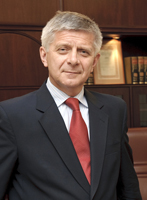 The prospect of Polish adoption of the euro became “clearer” after last summit of European leaders in Brussels. Polish central bank Governor Marek Belka is sure of it “even if we don’t want to name an entry date immediately.” The euro-area is moving toward closer political union, and Poland will “one day enter a new, different eurozone that carries the traits of a federation more than it does today,” said the Governor.
The prospect of Polish adoption of the euro became “clearer” after last summit of European leaders in Brussels. Polish central bank Governor Marek Belka is sure of it “even if we don’t want to name an entry date immediately.” The euro-area is moving toward closer political union, and Poland will “one day enter a new, different eurozone that carries the traits of a federation more than it does today,” said the Governor.
But a new poll finds that opinion continues to turn against adopting the single European currency. Fifty three percent of respondents told the OBOP pollsters that accession to the eurozone will be unfavourable for Poland.
Sixty five percent think that adopting the euro will have a negative impact on their household and 49 percent said they thought the single currency would have a negative effect on the economy. Only 22 percent thought the euro would be positive for the economy, 11 percent that it would have no effect and 18 percent answered “don’t know”. In 2007 the government said that they aimed to join the eurozone by 2012, but the finance crisis and debt levels forced to delay the plans.
Full Interview – Der Spiegel –
“Over the last 7 years (2007-13) only through the EU Cohesion Funds (the biggest in the EU’s regional assistance) the member states are supposed to receive about € 350bn attributed to more than 450 national and regional projects in the 27 member states. 
For example, in the Baltic States, Latvia will get € 4,6bn, Lithuania – € 6,9bn and Estonia – € 3,4bn; just to compare, Poland has got already € 67bn of the EU development grants since it joined the EU in 2004…
Over the next 18 months, the EU-27 governments will decide on the block’s next “financial programming” for 2014-20 with a total expenditures at the level of 1 trillion Euros… According to the Commission’s proposal published at the end of June 2011, the spending figures are the following (out of total € 1,025bn for the whole 2014-20 period) in %:
Economic growth & cohesion – 48;
Common agricultural policy – 27,5;
Other natural resources spending – 10;
Global action – 6,8;
Administration – 6,1;
Security & citizenship – 1,8.
Main contributors to the EU budget are known well: Germany, France, Italy, Sweden, the Netherlands, the UK and Denmark, which “donate” the lion share of the EU-27 budget. The main recipients are well known too: Poland, Greece, Belgium, Hungary, Portugal and the three Baltic States, though in much less degree…
The new EU member states from Eastern Europe are afraid that “milking the EU budget” through cohesion funds would come to an end. The Commission authorities argued that these worries were groundless: in the budget proposal the cohesion funds equal 37 per cent of the total budget (which is actually 2 per cent more that in the previous budget term).
However, some say, there are some grounds for assistance’s reduction, e.g. in the cohesion fund a new line of expenses is envisages, so–called “connectivity fund” of about € 40bn aimed to build cross-border infrastructure projects. In fact, these projects include high-speed railways and pipeline connections which might be of a primary benefit for the rich member states.
Besides some proposed changes in the eligibility rules for various EU funds would make in more difficult for poorer states to get financial support.
According to a Polish study, wealthy states can benefit from cohesion funds for the Eastern members: each euro in cohesion financing in Poland gives 36 cents to the richer states in the form of additional demand for goods and services. (Financial Times, 22 August 2011, p.5)…”
Article – Eugene Eteris – The Baltic Course.
Polska, Wyniki wyborów.
14 Oct 2011SEJM
| Komitet Wyborczy Platforma Obywatelska RP | 39,18% | 207 |
| Komitet Wyborczy Prawo i Sprawiedliwość | 29,89% | 157 |
| Komitet Wyborczy Ruch Palikota | 10,02% | 40 |
| Komitet Wyborczy Polskie Stronnictwo Ludowe | 8,36% | 28 |
| Komitet Wyborczy Sojusz Lewicy Demokratycznej | 8,24% | 27 |
| Komitet Wyborczy Wyborców Mniejszość Niemiecka | 0,19% | 1 |
Państwowa Komisja Wyborcza
La Polonia continua nel suo corso liberale – riformista. Questo l’esito delle insidiose legislative, assolutamente non così scontate come potrebbe sembrare. Per la prima volta dal crollo del Muro di Berlino un partito ottiene un secondo mandato consecutivo. A Varsavia si è forse trovato il giusto equilibrio tra stabilità e sviluppo. E la notizia non può che far piacere all’intera Europa.
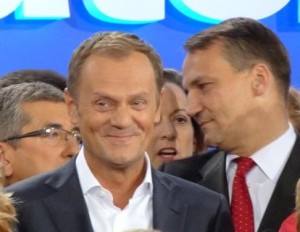
Donald Tusk ed il ministro Sikorski
Sono stati definitivamente sconfitti i fantasmi passati e più recenti. Con l’adesione all’Unione europea nel 2004 è entrato nei libri di storia il secolare penalizzante scenario di un Paese geostrategicamente schiacciato tra Russia e Germania. Gli ultimi tentativi in campagna elettorale di risvegliare i vetusti incubi sopiti nell’animo della nazione polacca non hanno prodotto risultati.
Varsavia è ormai pienamente dentro al processo di integrazione continentale. I suoi sostenitori sono in netta maggioranza. Sebbene Washington e gli Stati Uniti continuino ad essere per lei un punto di riferimento e di ispirazione il primato d’oltreoceano è ora messo in seria discussione da Bruxelles.
Neanche il premier Donald Tusk si aspettava una vittoria così. La sua espressione di entusiasmo nell’apprendere gli exit polls ne è la prova. L’ex dissidente liberale di Danzica ha evitato uno dei tanti colpi di coda così frequenti nella storia del Paese. Nelle ultime settimane i conservatori capeggiati dall’euroscettico Jaroslaw Kaczynski si erano tremendamente avvicinati, fermandosi al 30%.
La Polonia è oggi divisa in due, tra chi gode del boom economico e chi ne è rimasto fuori. Tusk ha, però, vinto perché ha collezionato una serie di successi. Ad esempio la Polonia è l’unico Stato Ue a non essere caduto in recessione nel 2009 anche grazie ai copiosi fondi strutturali europei (elargiti anche come ricompensa per l’abbandono del Paese nelle mani sovietiche dopo la fine della guerra) ed agli investimenti stranieri, soprattutto statunitensi.
La grande sorpresa di queste elezioni è rappresentata dall’incredibile avanzata nella cattolicissima Polonia della lista “anticlericale” dell’imprenditore Janusz Palikot, che si batterà per i diritti dei gay e la liberalizzazione della marijuana. In caduta libera sono, invece, gli ex comunisti, ora socialdemocratici, di SLD.
Inizia adesso per Tusk un nuovo mandato, più complicato del primo, soprattutto per la crisi economica internazionale. Oltre al rischio tipico di sedersi sugli allori, si devono gestire al meglio la trattativa in corso sul budget Ue 2014-2020 (a Varsavia dovrebbero andare 81 miliardi, nel precedente 67), l’importantissima vetrina dei campionati europei di calcio nel 2012 ed una maggiore liberalizzazione dell’economia. Vincere queste sfide, non dimenticandosi delle ampie differenze interne, garantirà alla Polonia un futuro di prosperità.
Poland-Polonia, exit polls
9 Oct 2011| Parties | 2007 | 2011 |
| Piattaforma civica – Civic Platform – PO | 41,5% – 209 seats | 39,6% |
| Legge e Giustizia – Law and Justice – PiS | 32,1% – 166 seats | 30,1% |
| Lista Palikot – Palikot’s movement |
Non partecipò – Did not stand |
10,1% |
| Socialdemocratici – Democratic Left A. – SLD | 13,2% – 53 seats | 7,7% |
| PSL Polish People party | 8,9% – 31 seats | 8,2% |
| PJN – Poland comes first |
Non partecipò – Did not stand |
2% |
TVP – TVN24 Warsaw 21h.
Affluenza alle urne 2011 – 48,92%
Turnout in 2011 – 48,92%
Affluenza in 2007 – 53,88%
Turnout in 2007 – 53,88%
Tusk contro Kaczynski. Il liberale contro l’ultra conservatore. Il moderno filo-occidentale, attualmente leader semestrale di turno dell’Unione europea, contro l’euroscettico, che critica pesantemente i nemici storici tedeschi e russi.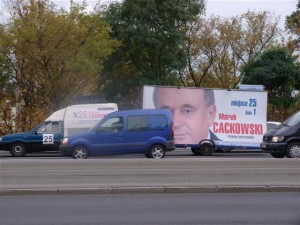
I polacchi, che appaiono sempre più divisi tra coloro che godono del boom economico di questi anni e chi invece si è ulteriormente impoverito, scelgono tra due visioni opposte. Non è un caso che il premier Donald Tusk abbia chiuso la sua campagna elettorale incontrando a Varsavia migliaia di ragazzi nel rinnovato stadio nazionale, simbolo della Polonia post comunista e fiore all’occhiello di Euro 2012. Jaroslaw Kaczynski, al contrario, ha preferito partecipare ad un pranzo tradizionale in provincia, ospite di una semplice famiglia. Città contro campagne, dunque. Giovani contro generazioni più mature.
Venerdì sera colpiva il visitatore straniero osservare il contrasto tra una decina di anziani con le candele in mano raccolti in preghiera davanti al palazzo presidenziale in ricordo dei morti della tragedia aerea di Smolensk dell’aprile 2010, mentre tutto intorno bar e ristoranti, pieni all’inverosimile di persone mezze ubriache appartenenti alla classe media, sparavano musica a tutto volume.
In queste tese settimane Tusk ha parlato di economia, di riforma delle pensioni, di controllo del deficit di bilancio e del debito (addirittura il 55% del Pil!). Il Paese, che sta gestendo le trattative per il bilancio continentale UE 2014-2020, è prossimo a nuove privatizzazioni ed alla costruzione di altre infrastrutture, finanziate sempre con i fondi europei (67 miliardi di euro nel precedente bilancio UE, forse 81 nel prossimo). Durante il suo premierato gli stipendi medi sono aumentati del 18%, la Polonia cresce da un decennio al ritmo del 3% ed è l’unico Stato Ue a non essere caduto in recessione nel 2009.
Jaroslaw Kaczynski, che non ha perso la sua bellicosità dopo la tragica morte del fratello-gemello presidente Lech a Smolensk, ha ribattuto punto su punto, aiutato dai candidati del suo partito Legge e Giustizia. Non ha, però, mancato di risvegliare i vecchi fantasmi, affermando che la Merkel è diventata cancelliera anche grazie alla Stasi, i servizi segreti della DDR.
L’ago della bilancia della partita potrebbero essere gli altri contendenti. Solo 5 formazioni – affermano sondaggi contrastanti – dovrebbero superare la barriera del 5%, per avere una rappresentanza parlamentare. Molto dipenderà dal tasso di affluenza alle urne e dalla performance di PSL, alleato di coalizione di Piattaforma civica di Tusk, mentre sorprende la forza della Lista “anticlericale” di Janusz Palikot a scapito dei socialdemocratici di SLD.
Se Piattaforma civica vincerà sarà il primo partito dal 1989 ad ottenere due mandati consecutivi. La paura della classe media nazionale e della Commissione europea è, però, che inizi un periodo di instabilità politica anche in Polonia. Un altro mal di pancia per Barroso e company non ci vorrebbe proprio!
“Thousands of minority Poles on Friday protested a new law in Lithuania that they claim discriminates against them and could diminish their education by demanding greater knowledge of the Lithuanian language.
The protests outside Parliament in the capital Vilnius underscored the contentious issue of language rights in Lithuania, a subject that has been the cause of tension in its relations with Poland.
Ethnic Poles number about 200,000 of Lithuania’s 3 million citizens, mainly the result of shifting borders after World War II. Many of these Poles speak Polish at home and attend Polish-language schools. But the law, which passed in March and took effect in July, introduces standardized Lithuanian exams for all upper-class students, which minorities believe will put them at a disadvantage vis-a-vis native speakers….
Waldemar Tomaszewski, a member of the European Parliament from Lithuania, said the government should “postpone this law until 2018 or maintain the right for students of ethnic minorities to pass exams in their native language.”
Over the past year, the language issue has led nationalist politicians in Poland and Lithuania to trade barbed criticism. Lithuania’s Polish residents are upset that they cannot spell their name in legal documents with the letter ‘w‘ _ a prominent letter in Polish that doesn’t exist in the Lithuanian alphabet…”
Full Article – Associated Press – Taiwan News
Berlin Syndrome, Joosten’s haunting debut novel.
25 Sep 2011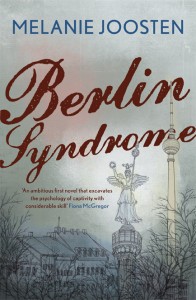 «Small-town Australia in the 1950s. I grew up knowing my parents came from a place called Poland. About Poland itself Iknew very little, ignorance that remained unchanged until I was an adult.
«Small-town Australia in the 1950s. I grew up knowing my parents came from a place called Poland. About Poland itself Iknew very little, ignorance that remained unchanged until I was an adult.
From early on, I knew Poland was ‘‘behind the Iron Curtain’’, which I actually conceived of as just that: one long curtain made of iron stretching right down from Gdansk to Trieste. (That’s a lot of curtain hooks, I know). Couldn’t get in. Couldn’t get out. Not the people; nor information about them. If I wondered at all about Poland, I came up with blanks every time. Truth is I didn’t know what I didn’t know until much later.
Yet I’ve always had a strange sense of emptiness, of a prison without walls, of a sameness and greyness, a place of silence and stillness, of unkempt cemeteries, of places overgrown, a barren landscape locked out of time.
I’ve never lost that sense, nor sought to disconfirm it. And within a few pages of starting Berlin Syndrome, it was with me again.
Melanie Joosten’s haunting debut novel is set in 2006 in the east of the once-divided German city. Pretty quickly you pick up on the ambience – the peculiar character of life in an ex-Soviet satellite.
The Russians are gone. The wall is down, sold off in thousands of fragments. But a frisson of the old Iron Curtain remains…».
Review – Ruth Wajnryb – The Sydney Morning Herald – September 24th, 2011.
Welcome
We are a group of long experienced European journalists and intellectuals interested in international politics and culture. We would like to exchange our opinion on new Europe and Russia.
Categories
- Breaking News (11)
- CIS (129)
- Climate (2)
- Energy&Economy (115)
- EU Eastern Dimension (85)
- Euro 2012 – Sochi 2014 – World Cup 2018, Sport (43)
- Euro-Integration (135)
- History Culture (198)
- International Policy (261)
- Military (74)
- Interviews (18)
- Italy – Italia – Suisse (47)
- Odd Enough (10)
- Poland and Baltic States (126)
- Religion (31)
- Russia (421)
- Survey (4)
- Turning points (4)
- Ukraine (176)
- Российские страницы (113)
Archives
- November 2020
- October 2020
- September 2020
- August 2020
- July 2020
- May 2020
- April 2020
- March 2020
- January 2020
- December 2019
- November 2019
- October 2019
- September 2019
- August 2019
- July 2019
- June 2019
- May 2019
- April 2019
- March 2019
- February 2019
- December 2018
- November 2018
- October 2018
- September 2018
- August 2018
- July 2018
- June 2018
- May 2018
- April 2018
- March 2018
- February 2018
- January 2018
- December 2017
- November 2017
- October 2017
- September 2017
- August 2017
- July 2017
- May 2017
- March 2017
- January 2017
- December 2016
- November 2016
- October 2016
- September 2016
- July 2016
- June 2016
- May 2016
- April 2016
- February 2016
- January 2016
- November 2015
- October 2015
- September 2015
- June 2015
- April 2015
- March 2015
- February 2015
- January 2015
- December 2014
- November 2014
- October 2014
- September 2014
- August 2014
- July 2014
- June 2014
- May 2014
- April 2014
- March 2014
- February 2014
- January 2014
- December 2013
- November 2013
- October 2013
- September 2013
- August 2013
- July 2013
- June 2013
- May 2013
- April 2013
- March 2013
- February 2013
- January 2013
- December 2012
- November 2012
- October 2012
- September 2012
- August 2012
- July 2012
- June 2012
- May 2012
- April 2012
- March 2012
- February 2012
- January 2012
- December 2011
- November 2011
- October 2011
- September 2011
- August 2011
- July 2011
- June 2011
- May 2011
- April 2011
- March 2011
- February 2011
- January 2011
- December 2010
- November 2010
- October 2010
- September 2010
- August 2010
- July 2010
- June 2010
- May 2010
- April 2010
- March 2010
- February 2010
- January 2010
- December 2009
- November 2009
- October 2009
- September 2009
- August 2009
Our books




